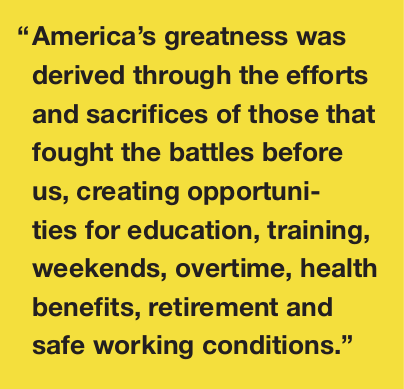
Chair, Human Rights
Committee
Once again, we have voted for another president to lead the United States of America. Those of us who voted for Clinton must lick our wounds and focus on what lies ahead.
Holding Trump accountable
In the midst of troubling times, we often look for simple answers to complex questions. Trump won, in part, because he made numerous promises that were very simple to understand, yet attempted to address complex issues.
We must now hold him accountable to his promises.
As union workers, focusing on what candidates say they will do for working people and our communities allows us to stay engaged even when our first choice loses. So, we need a renewed emphasis on understanding the importance of engagement.
An engaged electorate is the most powerful weapon in American history. An involved electorate is what makes America be its best.
An engaged electorate is the most powerful weapon in American history. An involved electorate is what makes America be its best.
As we focus on engagement, let’s focus on how we communicate to our members the simple truth that elections have consequences. But, don’t stop there.
Communicating that elections have consequences without effectively communicating what that means is not effective communication. Sharing the history of elections and how they impact collective bargaining is one step to understanding why elections have consequences. What is at risk today includes the National Labor Relations Board being stacked with anti-worker board members; the potential for a national right-to-work law, as well as other assaults on the ability to join a union without retaliation.
Why is this so important? Union worker wages are typically higher than nonunion wages and we need elected officials to protect that. Union members are “just cause” employees and not “at-will” employees. Our contracts provide protections against unfair discipline or terminations. We need to elect individuals that will strengthen workers rights, not weaken them.
Union contracts provide protections against discrimination. The grievance procedure in union contracts allows unions to fight for objective criteria for job qualifications. This, in turn, combats management decisions that are based on subjective criteria.
If we want to change what is going on in favor of working families, we have to do more than be happy with our union wages and working conditions. We will not have them if we continue to elect politicians who want to dismantle the laws that govern our ability to prosper.
Understanding our history
Teaching and sharing our union history is like fundamentals in sports; when you forget to lean on the fundamentals, you can be beaten by a lesser opponent. We need everyone to know and understand how far we have come. We need to share the battles those before us won that actually made America great for the middle class. America’s greatness was derived through the efforts and sacrifices of those that fought the battles before us, creating opportunities for education, training, weekends, overtime, health benefits, retirement and safe working conditions.
So, as we move forward, it is time to get back to the basics. Learn our history. Communicate our history.
What can you do?
Here are a few suggestions:
Start by calling your elected officials and letting them know you want them to work on behalf of working families and not just for corporate lobbyists.
Consider becoming a local delegate for your political party and support candidates that will work on behalf of the middle class and oppose candidates that do not.
If you don’t have any candidates that meet the standard of working on behalf of working people, consider running for office.
Elections are just the beginning. There is plenty we must do between now and the next one.
In Solidarity,
Clint Carson (chair), Milagros Valentin-Grantham, Matthew Marfione, Murphy Ball Jr., Nathan Waters, Robert Howard, Kelli Lacy

